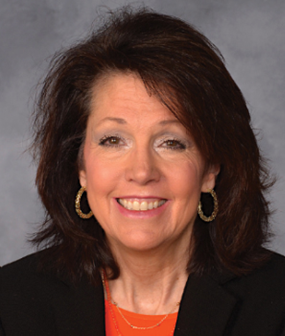At Kentucky Governor’s Scholars Program, ESSER funds help students find community in diversity – By Brennan Eberwine, Northern Kentucky Tribune
When students meet each other for the first time at the Kentucky Governor’s Scholars Program and ask where they’re from, they turn their hands sideways and curl in their thumb, creating a rough shape of the state.
“If you were from Centre College, you’d be in the middle,” explained Marshall County native Sarah Umbarger, pointing to her palm. “Or if you’re from Lexington, maybe a little over here, and it’s just where you are on the map, and it helps just like visualize like where people are at in Kentucky.”
The intensive five-week, residential summer program hosts 1,050 students on Bellarmine University, Centre College and Morehead State University campuses, where students learn about a subject they are interested in and gain skills to become future leaders for the Commonwealth. Of those students, 361 from 85 counties across Kentucky have converged on Centre College’s campus in Danville. It costs about $2,500 per scholar per year, but participants pay none of this cost.
In April 2021, the Kentucky Department of Education (KDE) announced its plans to direct $75,000 per year in 2021, 2022 and 2023 toward expanding GSP with federal Elementary and Secondary School Emergency Relief funding through the American Rescue Plan Act.
The additional funding provided by KDE has allowed GSP to focus on equity by opening spots for 30 more students and providing opportunities for students from historically underserved areas and backgrounds. Centre College’s campus director, Bryan Rich, was a Governor’s Scholar himself 26 years ago and has seen firsthand the impact on students.

Mayor Johnson asked Chicago youth for budget feedback. Hundreds showed up. – By Max Lubbers, Chalkbeat Chicago
In a new move for Chicago’s budget process, Mayor Brandon Johnson put out a call to the city’s young people: He wanted to hear what their priorities for spending are.
They responded in force. Within a week of the announcement, pre-registration for a youth roundtable was full. About 350 teens and young people showed up for the event on Tuesday, eager to talk about issues ranging from environmental justice and public health to education and affordable housing.
Johnson told the youth, ages 13 to 24, not to hold back on their opinions. Their input will inform a report laying out budget priorities, he said.
“Some people will try to write you off and say you don’t know enough because you’re not grown. On the contrary, I think you may know more,” he said. “Your unique voices and perspectives and lived experiences have the power to open our eyes to something we didn’t see before.”
The event was a new addition to the city’s typical budget process, which includes public hearings, ahead of the mayor releasing a proposal to the City Council by Oct. 15.

How Georgia is retaining new special ed leaders – By Kara Arundel, K-12 Dive
As part of its effort to recruit and retain special education professionals, the Georgia Department of Education is working to bolster guidance and support for new district special education directors.
At a Monday session during the U.S. Office of Special Education Programs’ Leadership and Project Directors’ Conference, Georgia DOE leaders spoke about how the state is preparing and supporting special education leaders.
Belinda Tiller, a program specialist at Georgia DOE, said the state’s Special Education Leadership Development Academy helps provide information and guidance to directors with less than four years of experience. The SELDA program has evolved over the last 20 years and now offers new leaders access to executive coaches with backgrounds in special education, general education and administration.
Additionally, SELDA organizers coordinate with the Georgia Council of Administrators of Special Education for monthly training sessions covering budgeting, data, parent engagement, dispute resolution and more, Tiller said.

Oklahoma Secretary of Education resigns, cites ‘complexity and political environment’ – By Kaylee Douglas, KFOR.com
The Oklahoma Secretary of Education has announced her resignation just three months after taking on the position, saying her skills are best utilized in a classroom.
In January, Governor Kevin Stitt reappointed now State Superintendent Ryan Walters as Education Secretary until 2027.
However, his appointment was never confirmed by the Senate and the Oklahoma Attorney General said Walters could not hold the Secretary of Education position while also being State Superintendent.
Now, Dr. Curry has stepped down after three months on the job, effective July 25.

Dr. Curry











